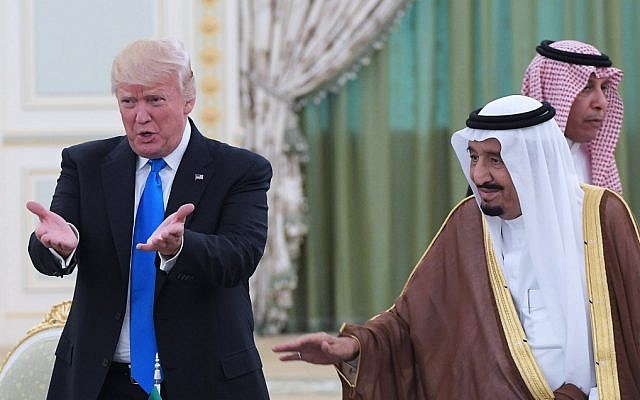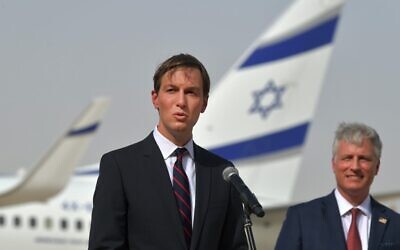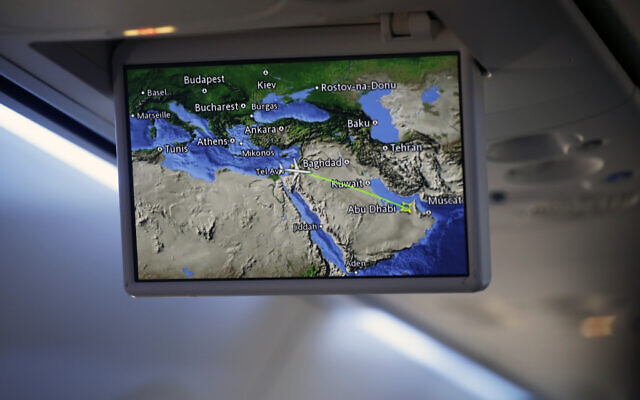In phone call, US president talks up peaceful overtures between Israel, Gulf; Salman says Riyadh appreciates US efforts but indicates Palestinians remain main focus for kingdom

Saudi Arabia’s King Salman praised US President Donald Trump for Washington’s diplomatic efforts in the region in a phone call Sunday, days after a top White House official visited to press the kingdom on normalization with Israel.
Salman “expressed the Kingdom’s appreciation for the efforts made by the United States of America to establish peace.” He also stressed “the Kingdom’s keenness to reach a lasting and just solution to the Palestinian cause to bring peace,” which he stressed was “the main starting point for the Kingdom’s efforts and the Arab Peace Initiative,” a statement carried by Saudi Arabia’s official news agency read.
Introduced in 2002, the Arab Peace Initiative is a Saudi proposal for recognition and normalization with Israel conditioned on the establishment of a Palestinian state.
Trump talked up the significance of the United Arab Emirates’ recent decision to forge an open relationship with Israel, in a possible push to encourage Riyadh to follow suit.
“President Trump highlighted the significance of the Abraham Accords and discussed ways to enhance regional security and prosperity,” a White House statement read.
He told the Saudi king that he welcomed Riyadh’s decision to allow Israeli planes to overfly its airspace on the way to and from the UAE, according to a statement from the White House.
Trump also urged the Saudis to negotiate with other Gulf states to resolve an unspecified rift, according to the statement, presumably referring to the spat with Qatar.
Salman, who placed the call to Trump, also discussed efforts to battle the coronavirus pandemic and Saudi Arabia’s position as head of the G20 this year, the Saudi press Agency said.

The call came amid a blitz by the White House to find other Arab countries beyond the UAE willing to openly normalize ties with Israel, though Saudi Arabia is widely seen as unlikely to do so any time soon.
On Tuesday, senior White House adviser Jared Kushner visited Saudi Arabia and Bahrain, reportedly to discuss normalization with Israel, after flying from Tel Aviv to the UAE on the first ever Israeli commercial flight between the destinations.
There was no comment from the White House on the call.
Saudi Arabia, which dominates the Western-allied Gulf Cooperation Council and is an important US ally, has consistently insisted that it will not normalize ties until after a peace deal is reached between Israel and the Palestinians based on the two-state solution. That stance is in line with the Arab Peace Initiative, a 2002 Saudi-led offer by the Arab League to immediately establish ties with Israel once the Israeli-Palestinian conflict is put to bed, and if Jerusalem returns the Golan Heights to Syria.
However, Riyadh has notably not criticized the UAE for abandoning the accord and has expressed a willingness for goodwill gestures toward Israel, which shares a common enemy in Iran.

US and Israeli officials have expressed high expectations that one or more Arab states will establish ties with Israel in the coming months on the heels of the UAE announcements.
Among the countries considered to be possible candidates are Oman, Bahrain and Sudan, with some also lumping in Saudi Arabia. Bahrain has indicated it will not make a move before Saudi Arabia does, and Sudan’s leaders told US Secretary of State Mike Pompeo that Khartoum’s transition government lacks the authority to forge a peace treaty with a former enemy country.
The Trump administration has been heavily involved in pushing to improve Israel’s international standing, in what some see as a pre-election maneuver to shore up support among evangelicals.
On Friday, Trump announced that former wartime foes Serbia and Kosovo had agreed to normalize economic ties as part of US-brokered talks that include Belgrade moving its Israeli embassy to Jerusalem, and mutual recognition between Israel and Kosovo.
As reported by The Times of Israel
